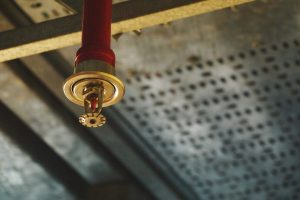By Frank Fortino

When Mayor Michael Bloomberg signed Local Law 26 of 2004 on June 24, 2004, the 15-year compliance deadline for the sprinkler requirement seemed like an eternity. All office buildings 100 feet or more in height had until July 1, 2019, to install a full sprinkler system.
Today, that deadline looms on the horizon. Only two provisions remain, with the first due within nine months.
- July 1, 2018. A licensed architect or engineer must submit the 14-Year Report, which certifies the percentage of the building currently sprinklered and details the implementation plan for full compliance.
- July 1, 2019. A licensed architect or engineer must submit the Final Report, confirming full compliance of the building.
Exceptions to the Compliance Deadline
Naturally, the law includes some exceptions. For example, partial waivers may be granted in the case of landmarked interiors or structural impracticality—conditions that will apply to a relatively small number of buildings.
Owners who cannot comply with the sprinkler requirement by July 1, 2019, “because of undue hardship” may state their case in a hardship letter, provided that all interim reports were filed. (The local law required submission of an owner’s affidavit by July 1, 2005, and a 7-Year Report by July 1, 2011.) In addition, owners must have secured approval for all applications, plans, and permits related to the required sprinkler installation.
The hardship letter must be filed by July 1, 2018, and include the following information:
- Supporting documentation for the hardship claim
- A detailed plan for bringing the building into full compliance
Keep in mind that more than 13 years have passed since the sprinkler requirement went into effect. With that much time to comply, the hardship will have to be truly unavoidable. “Lack of access due to tenant leases” probably will not qualify.
The Clock Is Ticking
Hopefully, most properties are on track for full compliance by the 2019 deadline. Based on some recent questions we’ve received, it sounds like some building owners may be banking on an extension—or exploring creative alternatives, such as temporary sprinkler loops. (In case you were curious, we have no reason to believe that a temporary sprinkler loop on a vacant floor would fulfill the local law requirements.)
Retrofitting older properties with sprinklers costs money and creates considerable hassle, particularly when coordinating with tenants for sprinkler installation. At the same time, these safety upgrades—the product of the World Trade Center Building Code Task Force recommendations—offer significant benefits. Specifically, these systems will dramatically improve the safety of tenants and visitors. Building owners will also see a return on their investment in the form of lower insurance costs.
Overall, these benefits outweigh the negative aspects of compliance in the long run.
If your property is behind schedule, however, you still have nearly two years before the final compliance deadline. Contact Metropolis Group at 212.233.6344, and we can help you craft a realistic implementation plan.
